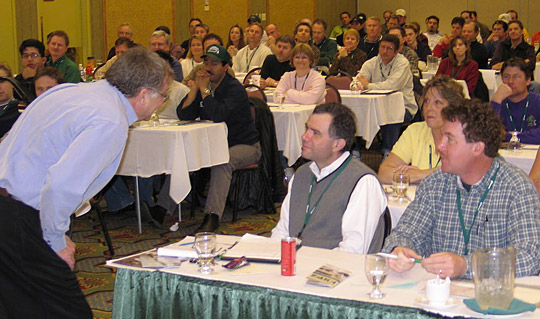Articles Written by Charles Vander Kooi

Charles Vander Kooi giving a seminar
Operations & organizations dropping the ball
By Charles Vander KooiContractors are always calling me to help them figure out why they're not making any money. There are several possible reasons. In this article I want to talk about operational and organizational issues.
Do you know if your field is efficient?
When contractors ask me about operational issues they often wonder if they're not making money because their field is not running efficiently. They don't have a way of monitoring it or tracking it. They just feel it in their gut. So I help them establish ways to see if their field is being efficient based on the prices they are charging.The key is job costing, being able to estimate jobs properly by man-hours, and then tracking the man-hours to see if you're going over them. If you're overrunning the man-hours it's one of 2 things: either you're not putting enough man-hours in there, or your people are taking too long.
If you win the job and the client says, "Man, you were cheap compared to all the other bids," then you probably didn't put enough hours in your bid. If there were lower bids, but the client hired you anyway and you still overrun the hours, then you have a problem in your field efficiency.
Many times I find there is a real operational problem that needs fixing. Other times I find that the field is efficient, but that there are other problems causing them not to make money. You are not going to be able to tell what's wrong unless you install a good system for job costing.
Organizational issues
If you have a small business each employee is going to wear a lot of hats. But because you're small it's much easier to have a handle on who is responsible for what. Mostly, it's going to be you. Organizational issues become a problem as a company grows, or as a company shrinks as many have during the downturn.When you add or subtract people in your company, it takes time, analysis and organizational expertise to sort out who should do what to achieve a highly efficient business. Instead, these decisions are typically made out of expediency so operations can keep rolling.
Over time, people often have tasks foisted upon them that they don't like or don't have the capacity to do. So by the time the owner calls me for help, there can be a lot of discontent and low morale.
A story of growing disorganization
Let me tell you about a client I have who like many contractors had no plan as to how his organization would look as it got bigger. As his company grew, he hired more people as he needed them. He needed help from each new employee in several areas, so he'd give them 3 or 4 different jobs. Pretty soon he had a company of 20 people.Each person had a multiplicity of things to do; help this person, help that person, help in this area, help in that area. No one had real accountability for any area. If something didn't get done, there were 3 or 4 people who maybe should have done it, and they were all pointing fingers at each other saying, "I thought that was their job."
One poor lady was wearing 4 hats. One day she'd be the marketer trying to come up with a marketing program. Next day she's a clerk, reviewing invoices and checking them against purchase orders. She also spent some time each day scheduling irrigation techs for the next day, and notifying clients when the tech would be there. If too many people were out of the office she'd answer the phone.
I went in and interviewed everyone in the company, asking them, "What is your job?" It was amazing. Several of them were doing the same job. We spent many, many months fixing the mess that had been created.
"Ball security" counts in the contracting game
I've often equated contracting to football. I think there's a lot of resemblance in many areas including organization.In football, every time the center snaps the ball or the quarterback hands it off or passes it there's an opportunity to lose the ball. What would you think of a coach who designed every play where the quarterback handed the ball off to the halfback who lateraled it to the fullback who pitched it back to the quarterback who threw it downfield. You'd think he was crazy because the odds of losing the ball during that play would be really high.
A lot of contractors complain to me that they have an organization where the ball is always on the ground and things don't get done. I often find the problem is their situation is just like that football play I just mentioned. One person hands the ball off to somebody else who hands it off to somebody else who throws it to somebody else. Nobody is responsible for picking up the job and getting it done.
Organizational issues are costly
The last 2 years I have spent more time on organizational issues than I have on just about anything else. It's an important part of tightening down costs and overhead so your company doesn't run like the government with 20 programs all doing the same thing.I've had the opportunity to be intimately involved with the businesses of 100s of contractors, and to get a feel for how work should flow in the smoothest, most cost effective way. We sort out what everyone has been doing, and what they have the capacity to do. We streamline job responsibilities and put systems in place to make people accountable with no redundancies of responsibilities.
Contractors across the country lose a lot of money every day because they don't job cost or because their organization isn't running efficiently. Are you one of those contractors?
Since 1980, Vander Kooi & Associates has been helping business owners add more to the bottom line of their company’s financial performance. We would be proud to help you with budgeting, estimating, high-performance management, marketing, sales, productivity and field training. Visit vanderkooi.com or call (303) 697-6467.













